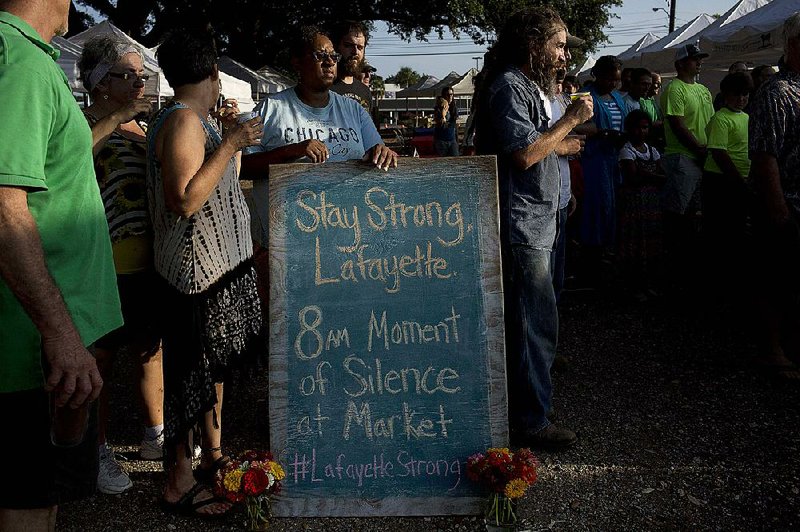LAFAYETTE, La. -- Police on Saturday thanked the many people providing tips about John Russell Houser as they work to reconstruct his movements before he killed two people, wounded nine and then killed himself in a movie theater.
By interviewing victims and witnesses and studying his cellphone records, Internet postings and other contacts, they hope to figure out what prompted the rightist extremist with a history of erratic behavior and violent threats to open fire.
"Our intelligence section is still analyzing a lot of that," Lafayette police Col. Paul Mouton said, adding that many people "feel they have had some sort of contact or run-in with this individual."
An initial report about Houser will likely be released this week, the police spokesman said. By Monday, officials expect to remove police tape and return some measure of normalcy to the theater.
Houser, 59, didn't say a word as he aimed at the audience, witnesses said.
Emily Mann, 21, escaped with her friend by crawling out on her hands and knees while he picked off his victims one by one.
Mann said they arrived late for Thursday's Trainwreck feature and found seats near the back of the small theater. They didn't notice the man in their row until he started firing, about 20 minutes into the movie.
"You hear one loud shot, and you're sure that's not what it is because it would never be that. And then you hear another and another and another and you realize that those aren't just lights and sounds," Mann said.
According to many accounts, Houser was a man with a reputation of angry behavior in the communities where he lived in Georgia and Alabama. Years ago, he had a regular seat on local television and radio shows and at board meetings, providing a counterpoint to more mainstream political voices.
He flew a large Confederate flag outside his home and a Nazi swastika outside a bar he owned, and put "doomsday" fliers in his neighbors' mailboxes, urging them to pool resources for the coming global economic collapse, his former neighbor Rick Chancey said.
Houser's family said he had a history of "manic depression and/or bi-polar disorder" as they convinced a judge that he needed mental health treatment in 2008. In 1989, another judge ordered a psychiatric evaluation for Houser after he was arrested and accused of trying to kill a lawyer by hiring an arsonist to torch his office, according to court records.
Houser became estranged from his family and lost his businesses, his home was foreclosed on, and when he was finally evicted, he ruined the property by pouring concrete into the plumbing and glue into the fixtures, police said.
After filing for divorce in March, his estranged wife, Kellie Houser, said he lashed out at her, saying "I'd better watch out because he always wins."
Houser's mother then called to say her son had "threatened to commit suicide in front of the retirement community where he believes her to be living if she didn't give him money," the divorce papers allege.
Given his background, authorities are being asked how he was allowed to buy a semi-automatic handgun from a pawnshop in Phenix City, Ala., where the sheriff said Houser's concealed weapons permit was denied.
Louisiana Gov. Bobby Jindal said Friday that "now is not the time" to discuss gun control.
On rightist extremist message boards, Houser praised Adolf Hitler as well as "the power of the lone wolf," according to the Southern Poverty Law Center, whose hate-group watchdogs began tracking Houser in 2005, when he registered to meet with former Ku Klux Klan leader David Duke.
Russell County Sheriff Heath Taylor said his office, which oversees Phenix City, denied Houser's request for a concealed weapons permit in 2006 because of the arson arrest and a domestic violence complaint that his wife ultimately dropped.
Pressed to explain why Houser wasn't convicted, Taylor pointed instead to cuts in the safety net.
"What should be scary for the community is that the cuts being made in mental health around the state are allowing these people, who should not be walking around, to be out in the community," Taylor said.
What prompted Houser to kill people Thursday night remains unknown. Police said it appears that suicide was not his first choice.
Inside the Motel 6 room he rented in Lafayette, police found wigs, glasses and other disguises. Houser also swapped the license plates on his 1995 Lincoln Continental before parking it by the theater's exit door. He stashed the keys atop one of its wheels.
The two women killed were 21-year-old Mayci Breaux, who was preparing to become a radiologist, and 33-year-old Jillian Johnson, who ran boutiques, played ukulele in a band and planted fruit trees for the homeless.
Among the wounded treated at Lafayette General Medical Center, all but two were discharged by Saturday, and they were listed in good condition, including the patient who had been in intensive care.
"I will never know those women, but I think there will always be a love for them," Mann said.
Information for this article was contributed by Melinda Deslatte, Michael Kunzelman, Russ Bynum, Jay Reeves, Ray Henry, Kim Chandler, Kate Brumback, Kathleen Foody and Kevin McGill of The Associated Press.
A Section on 07/26/2015

